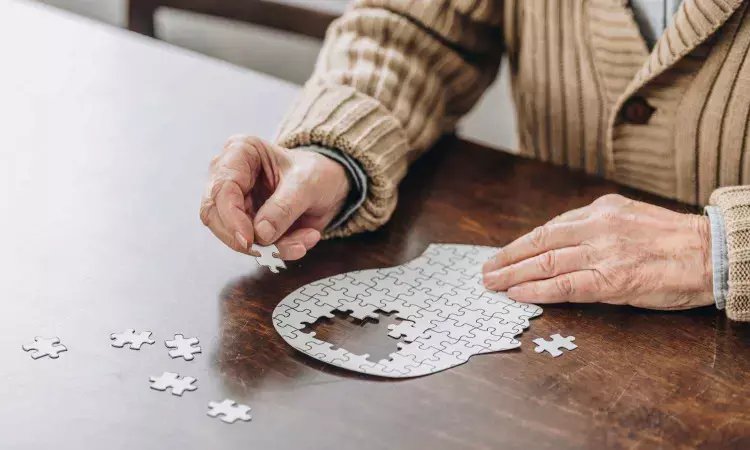- Home
- Medical news & Guidelines
- Anesthesiology
- Cardiology and CTVS
- Critical Care
- Dentistry
- Dermatology
- Diabetes and Endocrinology
- ENT
- Gastroenterology
- Medicine
- Nephrology
- Neurology
- Obstretics-Gynaecology
- Oncology
- Ophthalmology
- Orthopaedics
- Pediatrics-Neonatology
- Psychiatry
- Pulmonology
- Radiology
- Surgery
- Urology
- Laboratory Medicine
- Diet
- Nursing
- Paramedical
- Physiotherapy
- Health news
- Fact Check
- Bone Health Fact Check
- Brain Health Fact Check
- Cancer Related Fact Check
- Child Care Fact Check
- Dental and oral health fact check
- Diabetes and metabolic health fact check
- Diet and Nutrition Fact Check
- Eye and ENT Care Fact Check
- Fitness fact check
- Gut health fact check
- Heart health fact check
- Kidney health fact check
- Medical education fact check
- Men's health fact check
- Respiratory fact check
- Skin and hair care fact check
- Vaccine and Immunization fact check
- Women's health fact check
- AYUSH
- State News
- Andaman and Nicobar Islands
- Andhra Pradesh
- Arunachal Pradesh
- Assam
- Bihar
- Chandigarh
- Chattisgarh
- Dadra and Nagar Haveli
- Daman and Diu
- Delhi
- Goa
- Gujarat
- Haryana
- Himachal Pradesh
- Jammu & Kashmir
- Jharkhand
- Karnataka
- Kerala
- Ladakh
- Lakshadweep
- Madhya Pradesh
- Maharashtra
- Manipur
- Meghalaya
- Mizoram
- Nagaland
- Odisha
- Puducherry
- Punjab
- Rajasthan
- Sikkim
- Tamil Nadu
- Telangana
- Tripura
- Uttar Pradesh
- Uttrakhand
- West Bengal
- Medical Education
- Industry
Do night owls decline cognitively faster than early birds?

Because we are getting older, there are more and more people with dementia. Within a large national study, the BIRD-NL project, the UMCG, together with many partners, is researching ways to prevent dementia. ‘The fact is that your brain deteriorates after the age of 40, says Wenzler. ‘We study which lifestyle or other factors can reduce the risk of dementia.’
What is your chronotype?
Wenzler's area of research is sleep. 'Using Lifelines data, I look at people's sleep rhythms. Are you an early bird or a night owl? It's hard to adjust what your biological clock - your so-called chronotype - is, but you can adjust your life to it as best you can. In my research, I looked at whether your chronotype affects your cognition through behavior.'
Based on questionnaires that Lifelines participants filled in about their sleep times, Wenzler was able to determine the extent to which people are extreme early or late sleepers, and everything in between. She then looked at the results of a cognitive function test over a 10-year period: how did early scores differ from scores 10 years later?
More frequent unhealthy behaviour in the evening
The conclusion: evening people decline cognitively faster than morning people. ‘Unhealthy behavior such as smoking, drinking and unhealthy eating happens more often in the evening’, says Wenzler. 'In our study, we also saw this: evening people smoke and drink more often and exercise less. 25% of the risk of cognitive decline can be explained from our research by smoking and poor sleep.' Interestingly, the difference was found mostly in higher-educated people. 'That probably has to do with their sleep rhythm. They are often people who have to go back to work early in the morning and are therefore more likely to sleep too short, giving their brains too little rest.'
Genetic evolution
Wenzler, herself more of an early bird a night owl, explains how people's biological clocks are genetically altered. 'Children are morning people. That changes when you reach puberty, when you become an evening person. Around your 20s, that gradually shifts back towards morning people for most people. By the age of 40, most people are morning people again. But this is certainly not the case for everyone. In this way, evening people deviate from the norm'.
Work against your body as little as possible
There is little you can do about being an evening person. That is why Wenzler recommends working against your body as little as possible. 'You can try to go to sleep earlier, but if your body is not yet producing melatonin (sleep hormone, ed.) it will not work: your body simply does not want to sleep yet. We suspect that lower- or middle-educated people are more likely to have a job that allows them to take their sleep rhythm into account, such as a job in the hospitality industry or one with night shifts. If this is not possible, your brain does not get enough rest and you are more likely to adopt bad habits. It would be nice if more consideration was given to evening people who now have to work early: for example, by giving them the option of starting later.'
Follow-up research
Meanwhile, Wenzler's research continues. 'We are now investigating whether evening people are more likely to develop dementia. Faster cognitive decline in middle age does not necessarily mean a higher risk of dementia. With our research, we hope to find out more about this. This will ultimately help us to be able to give people informed advice on how to try to prevent dementia.
Reference:
A.N. Wenzler, A.C. Liefbroer, R.C. Oude Voshaar, N. Smidt, Chronotype as a potential risk factor for cognitive decline: The mediating role of sleep quality and health behaviours in a 10-year follow-up study, The Journal of Prevention of Alzheimer's Disease, 2025, https://doi.org/10.1016/j.tjpad.2025.100168.
Dr Kamal Kant Kohli-MBBS, DTCD- a chest specialist with more than 30 years of practice and a flair for writing clinical articles, Dr Kamal Kant Kohli joined Medical Dialogues as a Chief Editor of Medical News. Besides writing articles, as an editor, he proofreads and verifies all the medical content published on Medical Dialogues including those coming from journals, studies,medical conferences,guidelines etc. Email: drkohli@medicaldialogues.in. Contact no. 011-43720751


